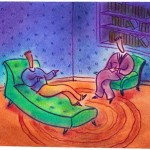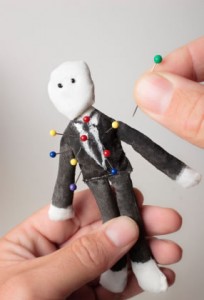We tend to live by the motto “tit for tat”. We repay an invitation to dinner with a counter-invitation; when a friend helps us to move house, we help to move his furniture a few months later. On the other hand, we repay meanness in the same coin. Scientists speak here of reciprocity. A person who repays friendly actions in a like manner is said to behave with positive reciprocity, and one who avenges unfairness acts with negative reciprocity. [continue reading…]
March 2009

Image credit: Getty Images
The BPS Research Digest takes a look at CBT. Glen Waller looks at why behavioural therapy (CBT), it doesn’t always seem to work with some therapists.
The biggest single problem, according to Waller, is that real life clinicians often fail to deliver proper CBT with all its active ingredients. For example, one of the most important aspects of CBT is behavioural change, yet clinicians often shy away from encouraging clients to adopt the changes they need to make, especially when such changes are likely to provoke increased anxiety in the short term. link to continue reading
Source: BPS Research Digest
Waller, G. (2009). Evidence-based treatment and therapist drift. Behaviour Research and Therapy, 47 (2), 119-127 DOI: 10.1016/j.brat.2008.10.018
John Wooden, affectionately known as Coach, led UCLA to record wins that are still unmatched in the world of basketball. Today, he continues to share the values and life lessons he passed to his players, emphasizing success that’s about much more than winning.
Source: TED
A new study sheds light on the way young children think
For parents who have found themselves repeating the same warnings or directions to their toddler over and over to no avail, new research from the University of Colorado at Boulder offers them an answer as to why their toddlers don’t listen to their advice: they’re just storing it away for later.
Scientists — and many parents — have long believed that children’s brains operate like those of little adults. The thinking was that over time kids learn things like proactively planning for and understanding how actions in the present affect them in the future. But the new study suggests that this is not the case.
“The good news is what we’re saying to our kids doesn’t go in one ear and out the other, like people might have thought,” said CU-Boulder psychology Professor Yuko Munakata, who conducted the study with CU doctoral student Christopher Chatham and Michael Frank of Brown University. “It also doesn’t go in and then get put into action like it does with adults. But rather it goes in and gets stored away for later.”
A paper on their study titled “Pupillometric and Behavioral Markers of a Developmental Shift in the Temporal Dynamics of Cognitive Control” will appear in the Proceedings of the National Academy of Sciences the week of March 23 [continue reading…]

